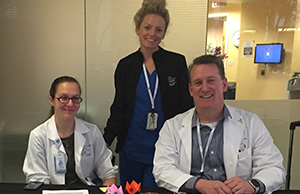-
Services
Featured Specialties
-
Locations
Location Type
-
Patients & Visitors

Stroke nurse navigators (l-r): Laura Scala, RN; Kaile Neuschatz, RN; and Kelsey Halbert, RN, staffed information tables in the cafeterias during National Stroke Awareness Month in May.
Yale New Haven is the first Connecticut hospital to employ stroke nurse navigators, who provide expertise and assistance to patients, their family members and clinicians throughout hospitalization and after discharge.
Since joining YNHH’s Stroke Program last spring, Kaile Neuschatz, RN, Laura Scala, RN, and Kelsey Halbert, RN, have been developing the navigator role, which includes educating patients and families and helping them deal with the medical, practical and emotional aspects of stroke. The nurse navigators are also involved in stroke awareness efforts in the community.
Nurse navigators have been part of oncology and pediatric care for several years, but are relatively new for stroke, said Karin Nystrom, APRN, manager, Stroke Program. YNHH is one of only about a dozen hospitals nationwide that has nurse navigators as members of the broader stroke team. The services navigators provide are integral to meeting certification requirements from The Joint Commission, which has designated YNHH’s Stroke Program as an Advanced Comprehensive Stroke Center.
YNHH’s stroke nurse navigators connect with patients almost immediately after their arrival at the hospital, responding to stroke codes in the Emergency Department and connecting with non-acute stroke patients and their families soon after admission.
“We are able to identify patients who will benefit from our services early on,” Neuschatz said.
Working with care team members, the navigators help ensure patients’ safe, smooth transitions from acute care, through recovery and after discharge. The nature of the navigators’ role provides them with a global view of patients’ needs.
“We are able to identify any gaps in the patient’s care, and link all the pieces together, Scala said. “We help promote communication among all the healthcare team members.”
After discharge, navigators help patients with medication compliance, follow-up tests and appointments and other needs – everything from transportation to medical appointments to support groups. Navigators will help patients who don’t have a primary care physician connect with one. They also ensure that patients get treatment for other medical conditions, such as diabetes and hypertension – common stroke risk factors in many YNHH Stroke Program patients.
“Many our patients and families can be in crisis with their new stroke diagnosis and with the complexities of stroke recovery care,” Halbert said. “These are things that might potentially fall off their list if we weren’t there.”
“Because they are with patients from the start, the navigators can identify those at high risk for complications, ensure they’re safely discharged back into the community and help them manage their health to prevent future strokes,” Nystrom said.